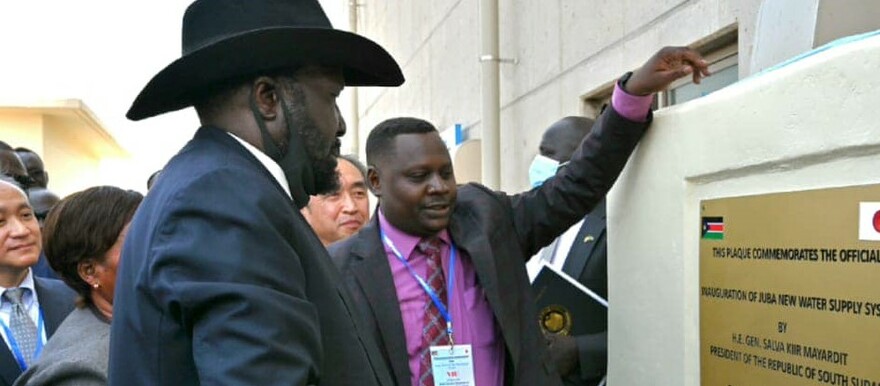The Japanese International Cooperation Agency (JICA) has launched phase one of its water supply system in the South Sudanese capital, Juba.
The operation of the $47.8 million water treatment plant and the project handover to the South Sudanese government was launched by President Salva Kiir Mayardit on Thursday. The project was commissioned at John Garang Mausoleum under the theme, “Safe and Clean Drinking Water.”
In 2013, JICA initiated a water treatment plant that includes the construction of a service reservoir and pipes for distribution in Juba.
The project was, however, interrupted by years of violence that resulted in the Japanese government evacuating its engineers from the country.
The new water supply system is expected to reach about 350,000 residents in Juba.
Speaking during the inauguration and handover ceremony in Juba, Kiir said the new water facility of 10,800 cubic meters will increase Juba’s daily water supply capacity from 7,200 cubic meters to 18,000 cubic meters to provide for more than one-third of Juba’s population.
The South Sudanese leader thanked the Japanese government for contributing to the water treatment plant. “What you have witnessed today is a development with a real impact on people’s lives, and for this, I would like to extend my sincere thanks to the government and people of Japan again for the gift of Freedom Bridge and today they are giving us the gift of water,” he said.
“For our Japanese friends, the people of South Sudan who received this gift from you will never forget your generosity. The work you have done here in South Sudan for all these years will shape our friendship not only at the government level but our people-to-people level for generations to come,” he added.
Kiir said the main challenge often faced when projects of such natures are handed over to the government by development agencies is the issue of sustainability. He instructed the minister for water resources and irrigation to make sure the project is operational.
“The challenge in front of us now is how we maintain the water supply system we have received today for the benefit of Juba residents. I want to say that we are dying of thirst when we are sitting on the Nile. The famous Nile was not able to provide us with water, although we were dying day and night. We will ensure that this project serves our people for a long time, and I am instructing leaders, who are here today, especially the ministry of water resources and irrigation, to exert efforts to effectively manage, operate and maintain this water supply system for the benefit of our people,” said Kiir.
For his part, Naohiro Tsutsumi, Ambassador of Japan to South Sudan, said the project will supply clean drinking water to the residents of Juba, easing the burden of diseases as a result of drinking unsafe drinking water.
“This water system is valuable because it will supply clean drinking water to the Juba City citizens. It is also valuable because clean water improves people`s health while reducing the stress of diseases. It is even more valuable because it reminds us of how good water resource management is on South Sudan’s peace and development,” Tsutsumi said
Meanwhile, Pal Mai, South Sudan’s Minister for Water Resources and Irrigation, said the country faces numerous challenges in access to safe and clean drinking water, blaming it on a lack of investment in water resources.
“South Sudan faces numerous challenges of safe and clean drinking water in urban and rural areas in various parts of the country; climate crisis and lack of investment in water infrastructure are major contributing factors,” he said.
“The government of South Sudan through the ministry of water resource and irrigation is working day and night to make sure that South Sudan and Juba, the national capital of the country, has five water distribution plants in the process,” Mai concluded.
Phase one of the water project connects the three blocks of Juba town, Munuki and Kator Payams.
Currently, the majority of Juba residents depend on untreated water supply from the River Nile. The city relies on water supply from mostly privately owned water tankers.




